Entrepreneurial Strategies for Advancing Arts-Based Public Engagement
as a Form of University-Sanctioned Professional Activity
in the New Creative Economy
Elizabeth Manley Delacruz
University of Illinois at Urbana-Champaign, U.S.A.
Citation: Delacruz, E.M. (2011). Entrepreneurial strategies for advancing arts-based public engagement as a form of university-sanctioned professional activity in the new creative economy. International Journal of
Education & the Arts, 12(Interlude 1). Retrieved [date] from http://www.ijea.org/v12i1/.
Abstract
Written in the first person and drawing from an autoethnographic methodological
framework, this essay shares aspirations, experiences, and reflections on a faculty
member's professional work in a large U.S. public research-oriented university,
focusing specifically on her attempts to reconcile her service-oriented civic
engagement work with her university's priorities and workplace conditions. The author
positions her work within a larger community of practice in art education higher
education, a community dedicated to embracing cultural diversity and social justice,
and whose work now takes place in multiple sites, including but not limited to schools
and universities. The author establishes linkages between contemporary art education
values and aims, and recently popular writings about the creative class, the new
creative economy, and the contributions of cultural creatives to community
development. These connections help the author establish a personal philosophical
foundation for her current work and to explore an entrepreneurial framework-both as a means of facilitating her own public engagement projects and for advancing public
engagement as a legitimate form of university faculty work. The essay is written as a
reflective narrative about lessons learned in pursuit of these aims. Through utilization
of short stories (or vignettes) of some of the author's public-engagement-oriented
work, she identifies entrepreneurial strategies that have facilitated this work along with
problems encountered, uncertainties, and failures. The essay concludes with an
optimistic but untested proposition that university faculty members may make a
difference in the world not only through their service-oriented civic endeavors, but
also in their ability to help shape and improve university institutional conditions that
make this work possible. As the author concludes, being connected to a community of
practice beyond ones current place of employment is central to these goals.
Visual Abstract

This article is available in PDF format.
|

